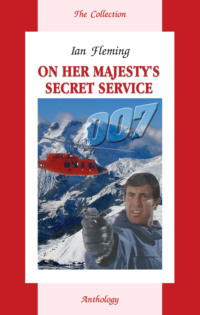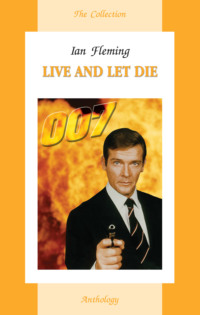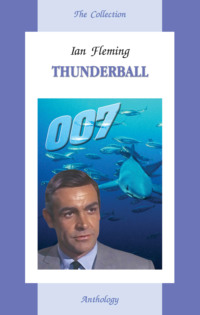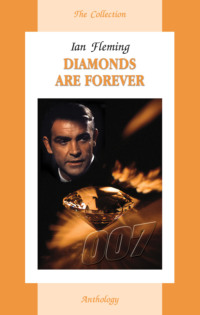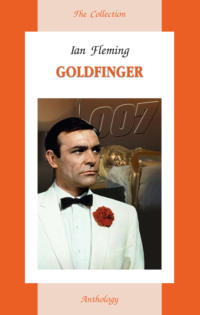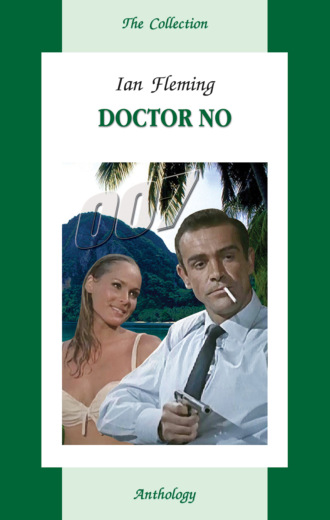
Полная версия
Doctor No / Доктор Ноу
“Don’t recall.”
“He says that courage is a capital sum reduced by expenditure. I agree with him. All I’m trying to say is that this particular man seems to have been spending pretty hard since before the war. I wouldn’t say he’s overdrawn – not yet, but there are limits.”
“Just so.” M decided that was quite enough of that. Nowadays, softness was everywhere. “That’s why I’m sending him abroad. Holiday in Jamaica. Don’t worry, Sir James. I’ll take care of him. By the way, did you ever discover what the stuff was that Russian woman put into him?”
“Got the answer yesterday.” Sir James Molony also was glad the subject had been changed. The old man was as raw as the weather. Was there any chance that he had got his message across into what he described to himself as M’s thick skull? “Taken us three months. It was a bright chap at the School of Tropical Medicine who came up with it. The drug was fugu poison. The Japanese use it for committing suicide. It comes from the sex organs of the Japanese globefish. Trust the Russians to use something no one’s ever heard of. They might just as well have used curare. It has much the same effect – paralysis of the central nervous system. Fugu’s scientific name is Tetrodotoxin. It’s terrible stuff and very quick. One shot of it like your man got and in a matter of seconds the motor and respiratory muscles are paralysed. At first the chap sees double and then he can’t keep his eyes open. Next he can’t swallow. His head falls and he can’t raise it. Dies of respiratory paralysis.”
“Lucky he got away with it.”
“Miracle. Thanks entirely to that Frenchman who was with him. Got your man on the floor and gave him artificial respiration as if he was drowning. Somehow kept his lungs going until the doctor came. Luckily the doctor had worked in South America. Diagnosed curare and treated him accordingly. But it was a chance in a million. By the same token, what happened to the Russian woman?”
M said shortly, “Oh, she died. Well, many thanks, Sir James. And don’t worry about your patient. I’ll see he has an easy time of it. Goodbye.”
M hung up. His face was cold and blank. He pulled over the signal file and went quickly through it. On some of the signals he scribbled a comment. Occasionally he made a brief telephone call to one of the Sections. When he had finished he tossed the pile into his Out basket and reached for his pipe and the tobacco jar made out of the base of a fourteen-pounder shell. Nothing remained in front of him except a buff folder marked with the Top Secret red star. Across the centre of the folder was written in block capitals: CARIBBEAN STATION, and underneath, in italics, Strangways and Trueblood.
A light winked on the intercom. M pressed down the switch. “Yes?”
“007’s here, sir.”
“Send him in. And tell the Armourer to come up in five minutes.”
M sat back. He put his pipe in his mouth and set a match to it. Through the smoke he watched the door to his secretary’s office. His eyes were very bright and watchful.
James Bond came through the door and shut it behind him.
He walked over to the chair across the desk from M and sat down.
“Morning, 007.”
“Good morning, sir.”
There was silence in the room except for the rasping of M’s pipe. It seemed to be taking a lot of matches to get it going. In the background the fingernails of the sleet slashed against the two broad windows.
It was all just as Bond had remembered it through the months of being shunted from hospital to hospital, the weeks of dreary convalescence, the hard work of getting his body back into shape. To him this represented stepping back into life. Sitting here in this room opposite M was the symbol of normality he had longed for. He looked across through the smoke clouds into the shrewd grey eyes. They were watching him. What was coming? A post-mortem on the shambles which had been his last case? A curt relegation to one of the home sections for a spell of desk work? Or some splendid new assignment M had been keeping on ice while waiting for Bond to get back to duty?
M threw the box of matches down on the red leather desk. He leant back and clasped his hands behind his head.
“How do you feel? Glad to be back?”
“Very glad, sir. And I feel fine.”
“Any final thoughts about your last case? Haven’t bothered you with it till you got well. You heard I ordered an inquiry. I believe the Chief of Staff took some evidence from you. Anything to add?”
M’s voice was businesslike, cold. Bond didn’t like it. Something unpleasant was coming. He said, “No, sir. It was a mess. I blame myself for letting that woman get me. Shouldn’t have happened.”
M took his hands from behind his neck and slowly leant forward and placed them flat on the desk in front of him. His eyes were hard. “Just so.” The voice was velvet, dangerous. “Your gun got stuck, if I recall. This Beretta of yours with the silencer. Something wrong there, 007. Can’t afford that sort of mistake if you’re to carry an 00 number. Would you prefer to drop it and go back to normal duties?”
Bond stiffened. His eyes looked resentfully into M’s. The licence to kill for the Secret Service, the double-o prefix, was a great honour. It had been earned hardly. It brought Bond the only assignments he enjoyed, the dangerous ones. “No, I wouldn’t, sir.”
“Then we’ll have to change your equipment. That was one of the findings of the Court of Inquiry. I agree with it. D’you understand?”
Bond said obstinately, “I’m used to that gun, sir. I like working with it. What happened could have happened to anyone. With any kind of gun.”
“I don’t agree. Nor did the Court of Inquiry. So that’s final. The only question is what you’re to use instead.” M bent forward to the intercom. “Is the Armourer there? Send him in.”
M sat back. “You may not know it, 007, but Major Boothroyd’s the greatest small-arms expert in the world. He wouldn’t be here if he wasn’t. We’ll hear what he has to say.”
The door opened. A short slim man with sandy hair came in and walked over to the desk and stood beside Bond’s chair. Bond looked up into his face. He hadn’t often seen the man before, but he remembered the very wide apart clear grey eyes that never seemed to flicker. With a non-committal glance down at Bond, the man stood relaxed, looking across at M. He said “Good morning, sir,” in a flat, unemotional voice.
“Morning, Armourer. Now I want to ask you some questions.” M’s voice was casual. “First of all, what do you think of the Beretta, the.25?”
“Ladies’ gun, sir.”
M raised ironic eyebrows at Bond. Bond smiled thinly.
“Really! And why do you say that?”
“No stopping power, sir. But it’s easy to operate. A bit fancy looking too, if you know what I mean, sir. Appeals to the ladies.”
“How would it be with a silencer?”
“Still less stopping power, sir. And I don’t like silencers. They’re heavy and get stuck in your clothing when you’re in a hurry. I wouldn’t recommend anyone to try a combination like that, sir. Not if they were meaning business.”
M said pleasantly to Bond, “Any comment, 007?”
Bond shrugged his shoulders. “I don’t agree. I’ve used the.25 Beretta for fifteen years. Never had a stoppage and I haven’t missed with it yet. Not a bad record for a gun. It just happens that I’m used to it and I can point it straight. I’ve used bigger guns when I’ve had to – the.45 Colt with the long barrel, for instance. But for close-up work and concealment I like the Beretta.” Bond paused. He felt he should give way somewhere. “I’d’ agree about the silencer, sir. They’re a nuisance. But sometimes you have to use them.”
“We’ve seen what happens when you do,” said M drily. “And as for changing your gun, it’s only a question of practice. You’ll soon get the feel of a new one.” M allowed a trace of sympathy to enter his voice. “Sorry, 007. But I’ve decided. Just stand up a moment. I want the Armourer to get a look at your build.”
Bond stood up and faced the other man. There was no warmth in the two pairs of eyes. Bond’s showed irritation. Major Boothroyd’s were indifferent, clinical. He walked round Bond. He said “Excuse me” and felt Bond’s biceps and forearms. He came back in front of him and said, “Might I see your gun?”
Bond’s hand went slowly into his coat. He handed over the taped Beretta with the sawn barrel. Boothroyd examined the gun and weighed it in his hand. He put it down on the desk. “And your holster?”
Bond took off his coat and slipped off the chamois leather holster and harness. He put his coat on again.
With a glance at the lips of the holster, perhaps to see if they showed traces of snagging, Boothroyd tossed the holster down beside the gun with a motion that sneered. He looked across at M. “I think we can do better than this, sir.” It was the sort of voice Bond’s first expensive tailor had used.
Bond sat down. He just stopped himself gazing rudely at the ceiling. Instead he looked impassively across at M.
“Well, Armourer, what do you recommend?”
Major Boothroyd put on the expert’s voice. “As a matter of fact, sir,” he said modestly, “I’ve just been testing most of the small automatics. Five thousand rounds each at twenty-five yards. Of all of them, I’d choose the Walther PPK 7.65 mm. It only came fourth after the Japanese M-14, the Russian Tokarev and the Sauer M-38. But I like its light trigger pull and the extension spur of the magazine gives a grip that should suit 007. It’s a real stopping gun. Of course it’s about a.32 calibre as compared with the Beretta’s.25, but I wouldn’t recommend anything lighter. And you can get ammunition for the Walther anywhere in the world. That gives it an edge on the Japanese and the Russian guns.” M turned to Bond. “Any comments?”
“It’s a good gun, sir,” Bond admitted. “Bit more bulky than the Beretta. How does the Armourer suggest I carry it?”
“Berns Martin Triple-draw holster,” said Major Boothroyd succinctly. “Best worn inside the trouser band to the left. But it’s all right below the shoulder. Stiff saddle leather. Holds the gun in with a spring. Should make for a quicker draw than that,” he gestured towards the desk. “Three-fifths of a second to hit a man at twenty feet would be about right.”
“That’s settled then.” M’s voice was final. “And what about something bigger?”
“There’s only one gun for that, sir,” said Major Boothroyd stolidly. “Smith & Wesson Centennial Airweight. Revolver..38 calibre. Hammerless, so it won’t catch in clothing. Overall length of six and a half inches and it only weighs thirteen ounces. To keep down the weight, the cylinder holds only five cartridges. But by the time they’re gone,” Major Boothroyd allowed himself a wintry smile, “somebody’s been killed. Fires the.38 S & W Special. Very accurate cartridge indeed. With standard loading it has a muzzle velocity of eight hundred and sixty feet per second and muzzle energy of two hundred and sixty foot-pounds. There are various barrel lengths, three and a half inch, five inch…”
“All right, all right.” M’s voice was testy. “Take it as read. If you say it’s the best I’ll believe you. So it’s the Walther and the Smith & Wesson. Send up one of each to 007. With the harness. And arrange for him to fire them in. Starting today. He’s got to be expert in a week. All right? Then thank you very much, Armourer. I won’t detain you.”
“Thank you, sir,” said Major Boothroyd. He turned and marched stiffly out of the room.
There was a moment’s silence. The sleet tore at the windows. M swivelled his chair and watched the streaming panes. Bond took the opportunity to glance at his watch. Ten o’clock. His eyes slid to the gun and holster on the desk. He thought of his fifteen years’ marriage to the ugly bit of metal. He remembered the times its single word had saved his life – and the times when its threat alone had been enough. He thought of the days when he had literally dressed to kill – when he had dismantled the gun and oiled it and packed the bullets carefully into the springloaded magazine and tried the action once or twice, pumping the cartridges out on to the bedspread in some hotel bedroom somewhere round the world. Then the last wipe of a dry rag and the gun into the little holster and a pause in front of the mirror to see that nothing showed. And then out of the door and on his way to the rendezvous that was to end with either darkness or light. How many times had it saved his life? How many death sentences had it signed? Bond felt unreasonably sad. How could one have such ties with an inanimate object, an ugly one at that, and, he had to admit it, with a weapon that was not in the same class as the ones chosen by the Armourer? But he had the ties and M was going to cut them.
M swivelled back to face him. “Sorry, James,” he said, and there was no sympathy in his voice. “I know how you like that bit of iron. But I’m afraid it’s got to go. Never give a weapon a second chance – any more than a man. I can’t afford to gamble with the double-o section. They’ve got to be properly equipped. You understand that? A gun’s more important than a hand or a foot in your job.”
Bond smiled thinly. “I know, sir. I shan’t argue. I’m just sorry to see it go.”
“All right then. We’ll say no more about it. Now I’ve got some more news for you. There’s a job come up. In Jamaica. Personnel problem. Or that’s what it looks like. Routine investigation and report. The sunshine’ll do you good and you can practise your new guns on the turtles or whatever they have down there. You can do with a bit of holiday. Like to take it on?”
Bond thought: He’s got it in for me over the last job. Feels I let him down. Won’t trust me with anything tough. Wants to see. Oh well! He said: “Sounds rather like the soft life, sir. I’ve had almost too much of that lately. But if it’s got to be done… If you say so, sir…”
“Yes,” said M. “I say so.”
Chapter III
HOLIDAY TASK
It was getting dark. Outside the weather was thickening. M reached over and switched on the green-shaded desklight. The centre of the room became a warm yellow pool in which the leather top of the desk glowed blood-red.
M pulled the thick file towards him. Bond noticed it for the first time. He read the reversed lettering without difficulty. What had Strangways been up to? Who was Trueblood?
M pressed a button on his desk. “I’ll get the Chief of Staff in on this,” he said. “I know the bones of the case, but he can fill in the flesh. It’s a drab little story, I’m afraid.”
The Chief of Staff came in. He was a colonel in the Sappers, a man of about Bond’s age, but his hair was prematurely grey at the temples from the endless grind of work and responsibility. He was saved from a nervous breakdown by physical toughness and a sense of humour. He was Bond’s best friend at headquarters. They smiled at each other.
“Bring up a chair, Chief of Staff. I’ve given 007 the Strangways case. Got to get the mess cleared up before we make a new appointment there. 007 can be acting Head of Station in the meantime. I want him to leave in a week. Would you fix that with the Colonial Office and the Governor? And now let’s go over the case.” He turned to Bond. “I think you knew Strangways, 007. See you worked with him on that treasure business about five years ago. What did you think of him?”
“Good man, sir. Bit highly strung. I’d have thought he’d have been relieved by now. Five years is a long time in the tropics.”
M ignored the comment. “And his number two, this girl Trueblood, Mary Trueblood. Ever come across her?”
“No, sir.”
“I see she’s got a good record. Chief Officer WRNS and then came to us. Nothing against her on her Confidential Record. Good-looker to judge from her photographs. That probably explains it. Would you say Strangways was a bit of a womanizer?”
“Could have been,” said Bond carefully, not wanting to say anything against Strangways, but remembering the dashing good looks. “But what’s happened to them, sir?”
“That’s what we want to find out,” said M. “They’ve gone, vanished into thin air. Both went on the same evening about three weeks ago. Left Strangways’s bungalow burned to the ground-radio, codebooks, files. Nothing left but a few charred scraps. The girl left all her things intact. Must have taken only what she stood up in. Even her passport was in her room. But it would have been easy for Strangways to cook up two passports. He had plenty of blanks. He was Passport Control Officer for the island. Any number of planes they could have taken to Florida or South America or one of the other islands in his area. Police are still checking the passenger lists. Nothing’s come up yet, but they could always have gone to ground for a day or two and then done a bunk. Dyed the girl’s hair and so forth. Airport security doesn’t amount to much in that part of the world. Isn’t that so, Chief of Staff?”
“Yes, sir.” The Chief of Staff sounded dubious. “But I still can’t understand that last radio contact.” He turned to Bond. “You see, they began to make their routine contact at eighteen-thirty Jamaican time. Someone, Radio Security thinks it was the girl, acknowledged our WWW and then went off the air. We tried to regain contact but there was obviously something fishy and we broke off. No answer to the Blue Call, or to the Red. So that was that. Next day Section III sent 258 down from Washington. By that time the police had taken over and the Governor had already made up his mind and was trying to get the case hushed up. It all seemed pretty obvious to him. Strangways has had occasional girl trouble down there. Can’t blame the chap myself. It’s a quiet station. Not much to occupy his time. The Governor jumped to the obvious conclusions. So, of course, did the local police. Sex and machete fights are about all they understand. 258 spent a week down there and couldn’t turn up a scrap of contrary evidence. He reported accordingly and we sent him back to Washington. Since then the police have been scraping around rather ineffectually and getting nowhere.” The Chief of Staff paused. He looked apologetically at M. “I know you’re inclined to agree with the Governor, sir, but that radio contact sticks in my throat. I just can’t see where it fits into the runaway-couple picture. And Strangways’s friends at his club say he was perfectly normal. Left in the middle of a rubber of bridge – always did, when he was getting close to his deadline. Said he’d be back in twenty minutes. Ordered drinks all round-again just as he always did – and left the club dead on six-fifteen, exactly to schedule. Then he vanished into thin air. Even left his car in front of the club. Now, why should he set the rest of his bridge four looking for him if he wanted to skip with the girl? Why not leave in the morning, or better still, late at night, after they’d made their radio call and tidied up their lives? It just doesn’t make sense to me.”
Конец ознакомительного фрагмента.
Текст предоставлен ООО «Литрес».
Прочитайте эту книгу целиком, купив полную легальную версию на Литрес.
Безопасно оплатить книгу можно банковской картой Visa, MasterCard, Maestro, со счета мобильного телефона, с платежного терминала, в салоне МТС или Связной, через PayPal, WebMoney, Яндекс.Деньги, QIWI Кошелек, бонусными картами или другим удобным Вам способом.


